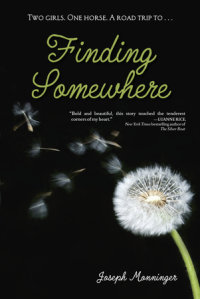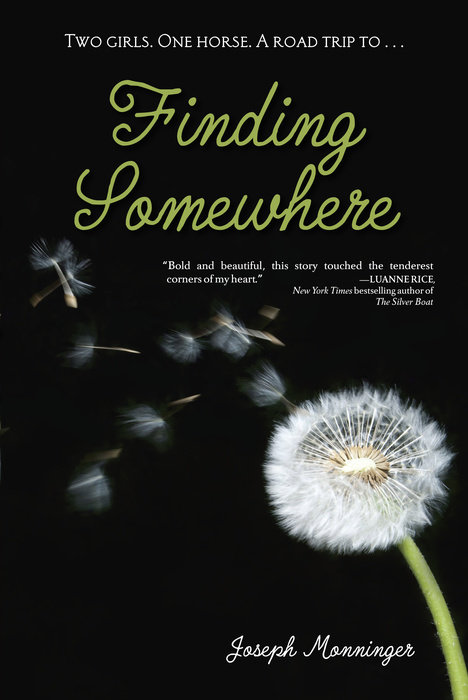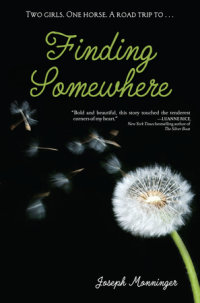Chapter 1
I slipped through the gate without any problem and heard the horses shift and move the way they do when something unfamiliar comes into their space. I knew the stable, of course, and I felt bad for sneaking in, but the Fergusons hadn't left me much choice in the matter. Luckily, a full moon gave me enough light. I walked quickly across the first paddock, where we usually saddled them, and Bucker looked over his stall and whinnied. I said, "Shhhhh," but he whinnied again, greedy bugger that he is, and I slipped close and gave him an apple. He chomped it the way he always does, the big blockheaded fool, but I kissed him on his star forehead and told him to be quiet.
"I'm here for Speed," I said. "Not you."
He slobbered over the apple. It was late September in New Hampshire, the leaves falling into tall grass. You could bite the air. You couldn't blame a horse for feeling it. The air made us all crazy.
I didn't turn…
Chapter 1
I slipped through the gate without any problem and heard the horses shift and move the way they do when something unfamiliar comes into their space. I knew the stable, of course, and I felt bad for sneaking in, but the Fergusons hadn't left me much choice in the matter. Luckily, a full moon gave me enough light. I walked quickly across the first paddock, where we usually saddled them, and Bucker looked over his stall and whinnied. I said, "Shhhhh," but he whinnied again, greedy bugger that he is, and I slipped close and gave him an apple. He chomped it the way he always does, the big blockheaded fool, but I kissed him on his star forehead and told him to be quiet.
"I'm here for Speed," I said. "Not you."
He slobbered over the apple. It was late September in New Hampshire, the leaves falling into tall grass. You could bite the air. You couldn't blame a horse for feeling it. The air made us all crazy.
I didn't turn on any lights. I walked down the boardwalk outside the stable doors and I gave a quick pat to the horses I passed. Pumpkin, Sally, Clumpy, Bees, Wally, and Sammy. Speed dozed in the second-to-last stall, next to Sammy, and he didn't even wake when I stood right in front of him.
"What a lazy bucket you are," I said when I reached for him.
I put my arms around him and he drooped his head over my shoulder and nuzzled his chin against my back. Other horses sometimes let you hug them, but Speed was the only horse I'd ever known who hugged back. He clamped me to him, his chin pulling me closer, and I held him for a little while and whispered what we were going to do. I told him I loved him, too, and he kept pressure on my back as though he were listening. As though he understood. Then I blew into his ear a little, to get it flicking, and he made a soft, gentle sound deep in his belly.
"Who's my boy?" I whispered to him. "Who's my favorite horse in the whole world? Who's my good, good boy?"
I kissed him on his cheek and on his forehead. Then I grabbed his halter and clipped a lead to it, and swung the stall door open. He plodded out, a big horse still, nearly sixteen hands at the withers, but old, and he walked quietly. He had manners. Everyone who had ever ridden him--and a million people had ridden him--knew that. He didn't kick or bite or fight the bit. His gentleness surprised you a little, because of his size, and if you didn't know better you expected him to go back on it, but he never did. True blue, really. I got him out and rubbed his ears and forehead a little, then put my ear against his cheek.
"You want to go for a ride?" I asked Speed. "You want to get out of here?"
He didn't, of course. No horse wants to leave a warm stall on a fall night to go walking in the dark.
He didn't know it was his last night alive. A horse doesn't know that kind of thing, even though it knows a whole lot more.
I tucked $240 on the hook of the saddle peg in Speed's stable. That was what I figured the saddle was worth. I had written a note, too, but now I debated about leaving it. I had spent a long time composing it, trying to strike the right tone. The Fergusons are good people, and good horse people, too, so I didn't want to hurt their feelings. I had worked for them two years, almost steadily, doing everything around the stables a person could do. I'd grown up in their barn, really, and I knew they weren't trying to be cold or uncaring about Speed. They figured he was broke for good and they had Carter, their grounds man, dig a pit grave with his backhoe out in the bones pasture. They had considered letting Speed live through the winter, but if a horse dies in the New Hampshire winter, you can't dig a grave for him--sometimes not even with a backhoe. It's a mess. They had come to a decision, and I didn't exactly blame them for it, but I believe a horse, or any animal, should have a chance to live as long as it has dignity. If it can't eat, or has horrible tumors--and I've worked with horses with both problems--then a merciful end is justified. But Speed's problem wasn't anything like that. He had gone dead in his heart, I felt, and didn't have much joy left, because for most of his life he had been treated like a machine. He worked in fairs, on pony ride circuits, at a horseback riding academy when he was younger. A horse-slave, Mr. Ferguson said about horses like Speed. The Fergusons had taken his body in, but not his heart.
I left the note on the hook with the money. I didn't want anyone to be confused about my motives. I didn't want the Fergusons to think I had betrayed them. It wasn't like I had a long, carefully planned plot in my head. I didn't want them to have that idea. I had decided to take Speed because I had to.
Dear Mr. & Mrs. Ferguson,
I am taking Speed on a little vacation. Don't worry, I've got it figured out. I'll take good care of him. I left $240 for the saddle, which I hope is fair, and if it isn't, I'll make it up to you in work. I hope you understand. Sorry to do this, but I couldn't stand by and let Speed go down tomorrow. Sorry. No offense. I'll be back in a month or two, and if you still want me to work for you, I'd like that. If not, I understand.
Hattie Wyatt


